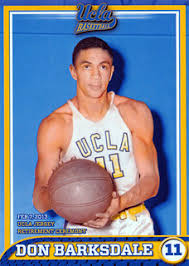The NBA Finals date back to 1947 (when they were known as the Basketball Association of America Finals) and the very 1st NCAA tourney was held in 1939. Olympic basketball competition is even older: it debuted as a demonstration event in 1904 and the men’s version became a medal sport in 1936, with the women finally getting their chance to go for the gold in 1976. The United States has dominated Olympic basketball competition from the start: the men have won 15 gold medals in the 18 tournaments they have participated in during the past 84 years, while the women have won 8 gold medals in the 10 tournaments in which they have competed during the past 44 years. Those of you who were looking forward to the 2020 Olympics opening ceremonies in Tokyo on July 24, 2020 will have to wait an extra 364 days, as the coronavirus caused a postponement until July 23, 2021. Due to the absence of college basketball since mid-March, HoopsHD’s Jon Teitel decided to fill the void by trying to interview as many prior Olympic players/coaches as possible so that you have something to read this summer while not watching the Summer Games. We continue our coverage by chatting with Chad Carlson, author of “Basketball’s Forgotten Experiment: Don Barksdale and the Legacy of the United States Olympic Basketball Team”, about Don winning a gold medal in 1948. Today marks the 8th anniversary of Don’s induction into the Hall of Fame.
In 1948 Don became the 1st African-American to play on a US Olympic basketball team, but after traveling to Kentucky to scrimmage the 1948 NCAA champs he was not allowed to stay at a hotel with the rest of the team and had to stay with a local African-American family instead: how did he feel about being good enough to represent his country despite hotels in Lexington feeling that he did not have the right skin color to stay there? The 1948 US Olympic basketball team was split into 2 groups: the University of Kentucky 5 plus 2 collegians trained in Lexington with Coach Adolph Rupp while the 5 AAU players from the Phillips 66ers trained with Barksdale, Baylor’s Jackie Robinson (huge coincidence: he was White!), and head coach Omar “Bud” Browning in Bartlesville, OK (home of the 66ers). Both areas were segregated but Oklahoma’s Jim Crow laws were a bit more accommodating than Lexington for 2 reasons: the presence of large numbers of Native Americans, as well as Barksdale’s light skin tone. When he stayed at an all-White hotel with his teammates in Tulsa during a fundraising exhibition there was an elderly woman who complained. The hotel manager told the woman that Barksdale was Persian…and she dropped the matter: that would not have happened in Lexington. While there for the last of 3 intra-squad scrimmages before the Olympics Barksdale’s White teammates stayed at a nice hotel and had country club access that he did not have. In fact, there is some evidence that his life was threatened via a letter he received the day before the scrimmage. The Wildcats had never played against a Black opponent at that time and would not do so again until the following decade. Further, Rupp would not have an African-American player on his team until 1970 (Tom Payne), so Barksdale’s participation in a game against 5 Kentucky players coached by Rupp was truly groundbreaking. Remember: this was only 1 year after the other Jackie Robinson had broken baseball’s color line so integrated sports was still a new concept. Black athletes knew that in order to leave their mark in mainstream sports they had to be overly-qualified while also accepting 2nd-class treatment. Barksdale was more than qualified and had great composure. The local Black community celebrated him during his short stay in Lexington. Black fans crammed into the end zone section of UK’s football field that had been transformed into a basketball court for the scrimmage: this was the only place where non-White spectators could sit to watch the action.
What did it mean to him to represent his country/race, and what did it mean to him to win a gold medal? This was only the 2nd Olympic basketball tournament ever (the 1st 1 was in 1936 and the Games were cancelled in 1940/1944) and the competition was not very good so winning was never in doubt. Essentially, anyone who made the US roster was ensured of winning a gold medal so the most difficult thing for Barksdale was making the team. He had a very strong individual showing at the Olympic Trials in New York City but his team did not play very well. He was eventually chosen for 1 of the 4 at-large roster spots. He was likely the only African-American player at the trials, although 1 of the 5 Phillips 66ers players was Native American Jesse “Cab” Renick. After the London Games Renick became the 1st Native American gold medalist since Jim Thorpe! The basketball selection committee was quite progressive, including a strong voice from New York City in lawyer Harry Henshel who fought vigorously against racial exclusion. Barksdale also received support from Olympic basketball committee representatives out west who were quite familiar with his abilities and (maybe more importantly) his ability to fit in with an all-White team.
After graduating he became the 1st African-American radio DJ/beer distributor/TV host in the Bay area: was this due to him being interested in various businesses or did he just need to make some money while waiting for the NBA to eventually integrate? There were plenty of college basketball stars at the time who eschewed the NBA to play on the AAU circuit. At the time the AAU was filled with companies across the country that would hire top college basketball graduates and then pay them to both work and play basketball for the company. Barksdale was clearly interested in disc jockeying/entertainment but his interest in beer distributorship is unclear. Nonetheless, the Bittner Company in Oakland hired him and had an AAU basketball team that he played for. This brought him back to his hometown and allowed him to play high-level basketball while also learning trade skills he could use once his basketball skills diminished. The NBA did not exist when he graduated from UCLA so that was not an option: the league was founded in 1949 and Barksdale joined the following season.
He was a 3-time AAU All-American as a player for the Oakland Bittners and won the 1949 AAU national title: what did it mean to him to break the Phillips 66ers’ streak of 6 straight AAU titles? At the time of the Bittners’ victory over the 66ers there were 5 guys on the 66ers who were teammates of Barksdale during the Olympics. He knew those guys and had trained with them as teammates so there was a great deal of respect there. They knew what he was capable of and vice-versa but the 66ers were not the same team as in the past. Browning retired from coaching after the Olympics (for a few years at least) while Renick and 2 other Olympians did not return to the 66ers for the 1948-49 season so it was a very different squad compared to what it was before the Olympics.
He only played 4 years in the NBA before retiring due to injuries but his style of basketball (running up and down the court and playing both above and below the rim) foreshadowed the modern era of the game: do you think that his stats suffered due to not receiving more passes from his White teammates in Baltimore/Boston? That is certainly a possibility but Barksdale played basketball in an era that did not quantify much on the court and was not obsessed with statistics. All of our sports are heavily quantified now and we rely far too much on stats in sports. Barksdale was good and his teammates/opponents/coaches knew it…but statistics do not show his true prowess because they only existed in primitive fashion. The lone Black players from each team would often be told to guard each other regardless of their size/position. When this was the case, racial dynamics played a major factor in each team’s strategies. Fortunately for Barksdale he was very good at doing the things that White coaches stereotypically wanted out of Black players: defending/rebounding above the rim and scoring above the rim/close to the basket.
He passed away in 1993 but was posthumously inducted into the Hall of Fame in 2012: when people look back on his career, how do you think that he should be remembered the most? Barksdale should be remembered right alongside Jackie Robinson. His accomplishment is not as recognized as Robinson’s because basketball (especially pro basketball) was not nearly as big a deal as baseball was at the time but his accomplishment was no less impressive.




